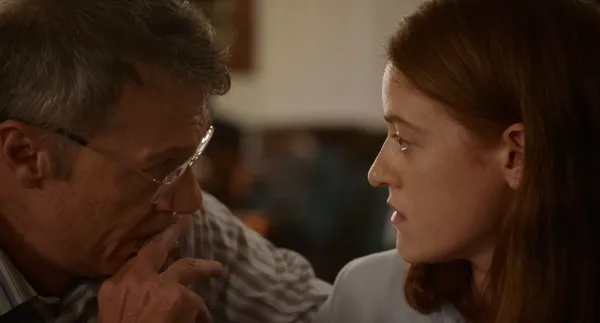Eye For Film >> Movies >> Moon, 66 Questions (2020) Film Review
Moon, 66 Questions
Reviewed by: Jennie Kermode

What day is it? Artemis (Sofia Kokkali) tells us the answer promptly in each section of this meandering, distinctively styled film, adding a note about which female celebrities have birthdays on that day. At one point she notes that the 10th of August was the day of Cleopatra’s death. Though she positions herself within this landscape of women, her life revolves, almost literally, around a man, as she is summoned back to Athens to take care of her ailing father: to lift him and move him and wash and clean and dress him as he succumbs to fulminant multiple sclerosis.
Why does this duty fall upon her? She has been living overseas for years, has barely known him as an adult, but there is an assumption amongst all the older relatives who crowd around them both that nothing else she could be doing with her life is terribly important. As every carer will understand, her new role is an exhausting one, both physically and psychologically. A specialist shows her how to carry out the necessary tasks, but then she is left with no support at all. Her father (Lazaros Georgakopoulos) can barely communicate, but we can see in his eyes that he retains his intelligence. As a man who has enjoyed good health in the past, who loved to play basketball, he is also finding the situation intensely frustrating. Can the two learn to sympathise with one another because of this?

Films about serious illnesses and caring are frequently exploitative, even when they purport to be raising awareness. They strive to wring tears out of the audience but rarely invite viewers to empathise with the person who is actually ill. Moon, 66 Questions is a different beast. Although Artemis remains squarely at the centre on the narrative, the focus here is not simply on her sorrow or her struggle but on the connection she finds with her father.
This develops in fits and starts. Initially, old resentment colours the relationship. It’s all too easy for her to blame him for her current difficulties. Over time, however, something else emerges. When he falls in a garden centre, she instinctively rushes to his aid, and there’s a natural tenderness between them. Eventually, the discovery of a secret will change her perspective on everything. In the course of this, viewers also come to see him as a human being, and the arc of the film is not one of spiralling misery but of an unexpected path to joy.
Part of this process is narrative; much more of it comes down to how director Jacqueline Lentzou handles the camera, in combination with Smaro Papavangelou’s frenetic editing. The experience is one of being plunged into somebody else’s world, constantly in the middle of something, having one’s personal space invaded. The world is a maze of wandering gazes and quick glances, unexpected distractions and moments of deep intensity. Information comes at us in flashes and often seems disorganised, but Lentzou knows exactly what she’s doing, letting it all build up until we share her characters’ understanding. The pace gradually slows down as Artemis finds her balance. This is impressionistic filmmaking and the young director handles it with extraordinary confidence.
Four tarot card flash up at intervals, introducing chapters of the film. The Two of Swords, signifying not conflict but the need to find balance as one is torn between two options of apparently equal importance. Strength (traditionally depicted as a young woman), which Artemis will need plenty of, but which might not manifest as she expects. The World – the ultimate achievement both materially and spiritually – and the Magician, representing efforts to control one’s environment, to apply human agency to the chaos of life. They’re little pieces of Artemis’ soul, of her way of understanding what’s going on around her, and compensate for the fact that we cannot get to know her in the conventional way, by seeing her approach life on her own terms.
In a key scene, Artemis tries to pull a big SUV out of an underground parking lot. The vehicle won’t cooperate, and she struggles to manoeuvre it in the tight space, losing her patience, eventually bumping into things. It’s a neat metaphor for her father’s situation, but also for her own. Sometimes the universe just refuses to give way. The song over the film’s closing credits, a sudden burst of emotion after so much frustration and restraint, suggests that sometimes it’s enough just to go with the flow.
Reviewed on: 22 Jun 2022

















